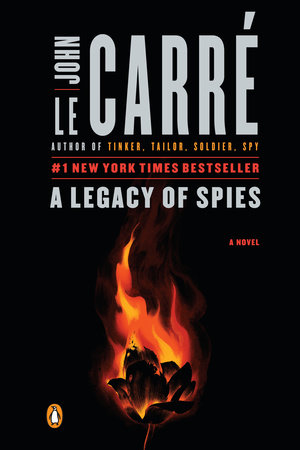essays
John le Carré’s Sad Spies Offer a New, Better Vision of Masculinity
Forget James Bond—broken men full of feelings are the real heroes

In the final pages of A Legacy of Spies, John le Carré’s 24th and most recent novel, Peter Guillam’s lawyer makes a plea to the former spy. “So our feelings. Can we talk about them for a change?” asks the lawyer, who has been steadfastly trying to determine her client’s role in a casualty-ridden cold war mission. “So much more illuminating than facts, I always think.”
Stylistically, this might be an incongruous line for a John le Carré novel. His prose, which generally unfurls with the subtlety and slow-burning devastation of a long-term arsenic dose, has rarely been this blunt before; his characters have always preferred quietly crumbling under the weight of their emotions to directly addressing them. In terms of substance, though, it could easily double as a thesis statement for his entire body of work. Facts are important in le Carré’s world; his spies spend hundreds of pages at a time digging and dying for facts. But it’s feelings — about that work, their pasts, themselves, their masters, their missions, and their results — that truly fuel their stories.
Le Carré’s extensive use and command of emotion in his work has always subverted the spy novel, even as his books — and his very pen name — have come to define it. In a genre typically preoccupied with action and ideals, classics like The Spy Who Came In From The Cold and the Karla Trilogy are notable for being deeply rooted in the internal lives of their characters. Action, as slow as it may be in le Carré’s world, is fraught with both global and individual consequences. Ideals crumble under the human cost of upholding them. Everyone has been broken by an authority that they trusted, whether it’s a father, a surrogate father, or an institution. Most often, it’s all of the above.
The stoic, hyper-masculine, and eminently capable spies that dominate so much of the genre on the page and on screen are absent in these works, replaced with broken men who are at war with themselves as much as with the enemy. Le Carré’s most famous character, George Smiley, is the very antithesis of James Bond. He’s aging, dumpy, and owlish, and constantly cuckolded by his much more charming and attractive wife. He works slowly and meticulously. His victories, such as they are, haunt him as much as his failures. The Spy Who Came In From The Cold’s Alec Leamas, The Honorable Schoolboy’s Jerry Westerby, The Night Manager’s Jonathan Pine are all, in their own way, weighing past failures and crises of faith against dangerous acts of hollow redemption. Even Peter Guillam, the closest that any le Carré character comes to the action hero archetype, is a mess when he’s first introduced in his most recognizable form (Guillam briefly appeared as Smiley’s contemporary in le Carré’s debut, Call for the Dead, before settling into the role of protégé in the later Smiley novels). He’s suave, womanizing, cool, and handsome. But he’s also on the verge of a nervous breakdown, sublimating his ambivalence about his calling and his loss of faith in everything and everyone (at least, everyone not named George Smiley) into increasingly paranoid and jealous theories. In a culture where masculinity is often marked by stoicism, a reader might know more about the emotional lives of John le Carré’s action heroes than about most other men in her life.
The stoic, hyper-masculine spies that dominate the genre are absent in these works, replaced with broken men who are at war with themselves as much as with the enemy.
Le Carré’s connection to his material also defies expectations. His own past as a spy was a key part of the marketing around his books in the early years and swiftly became part of his mythology thereafter, but the actual life experience that most informs his work is far more personal in nature. He writes less as a former MI5 agent than he does as the brokenhearted and abused son of a con artist. Le Carré’s (born David Cornwell) ruinous relationship with the charming but poisonous Ronnie Cornwell looms over every interaction in his oeuvre.
“From the day I made my first faltering attempts at a novel, he was the one I wanted to get to grips with,” Le Carré writes in “Son of the Author’s Father” from 2016’s autobiographical essay collection, The Pigeon Tunnel. The damage that Ronnie left in his wake also presents itself in my forms over the course of his son’s career. “Under yet other names he has appeared repeatedly in my novels,” Le Carré admits in passing while describing one of Ronnie’s best friends and victims, in an earlier version of the story that appeared in The New Yorker in 2002. He’s not simply a spy novelist; he’s a confessional writer who happens to work in the spy genre.
The emotional content of le Carré’s novels is, by far, the primary source of their resonance and endurance. It’s certainly not political relevance that has kept the writer’s popularity so steady over the course of a very unsteady half century. The Cold War, during which he forged his most famous books, ended during that period, and the distrust of America that wove in and out of his later work threatened to look anachronistic for a period of time. But even as his villains and their affiliations shifted, the power of his work remained remarkably solid. Circumstances change with time, but people don’t, which makes the exploration of their feelings eternally relevant. Whether he mines Russian moles, the arms trade, or the pharmaceutical industry, it is always heartbreak, disaffection, existential crises, and melancholy that illuminates his writing.
Even if our political world hadn’t gleefully swung back to the same enemies, paranoia, and fear of global annihilation that provided the backdrop for his classics, his work would remain equally relevant today. (And, arguably, the most le Carré thing of all about our current situation is also rooted in the personal: Our lives hang on the whims of a man whose father didn’t love him.)
Whether he mines Russian moles or the arms trade, it is always heartbreak, disaffection, existential crises, and melancholy that illuminates his writing.
Le Carré’s works are politically-minded, but the politics inevitably take a back seat to the characters’ emotional dramas — or perhaps it’s more accurate to say that the politics exist to serve the emotional story. Politics matter to the author because they inevitably have a human cost. They provide the framework through which his characters’ personal lives, and the ways in which global issues can manifest themselves in an individual’s emotional state, can be explored. Far from reducing politics to melodrama, though, le Carré’s extremely emotional stories about individuals actually help to broaden and deepen his reader’s understanding of these complex issues.
The Spy Who Came In From The Cold, for example, which le Carré called “the work of a wayward imagination brought to the end of its tether by political disgust and personal confusion,” is set during the Cold War. Many of the events take place in the literal and figurative shadow of the Berlin Wall, where the aging and embattled Alec Leamas infiltrates East German intelligence on a mission to bring down an agent — and where Leamas and his idealistic young girlfriend, Liz, become pawns in a much different plot. But it is Leamas’ emotional state that fuels the narrative, from the need for a modicum of redemption that makes him accept the assignment, to the broken mix of love and loyalty that sparks his final, tragic decision. The plot is the stuff of a prototypical spy thriller, ostensibly about Western machinations behind the Iron Curtain, but it is ultimately a book about betrayal, duty, and hypocrisy, passionately wrought by its author and achingly felt by his characters. Similarly, Tinker, Tailor, Soldier, Spy spins what could have been a straightforward search for a Russian mole into an interpersonal tragedy of broken friendships, surrogate family ties, and love affairs. The weight of its climax doesn’t come from the mole’s undermining of his country and service, but from the the mole’s betrayal of his fellow spy — who also happens to be his lover. (In case there was any lingering confusion about the subtext between Haydon and Prideaux in TTSS, Guillam confirms the romantic relationship in A Legacy of Spies.)
If his past novels weren’t so much more than the sum of their intrigues, it would be easy to dismiss le Carré’s latest work, A Legacy of Spies, as a simple act of pandering. The choice to return to George Smiley’s world and the events of Spy and Tinker, Tailor could be construed as the lazy choice of a late-career writer surrounded by a culture obsessed with reunions, remakes, and reboots. But Legacy’s emotional undercurrents make the rather slight (by le Carré standards) volume a far more complex affair, and the perfect coda to the Smiley series. Perhaps it’s the perfect coda to his entire body of work.
By producing such a broken masculinity within his pages, le Carré has come as close as any author has to illuminating men’s true humanity and making them whole.
Until now, Peter Guillam’s faith in George Smiley has remained uniquely unchallenged in le Carré’s novels. Guillam has questioned everyone else — including himself — to the point of neurosis, but he has always been anchored in his belief that his mentor and father figure was on the side of the angels. After spending multiple novels at Smiley’s side as the latter hunts down his Russian nemesis, Karla, and witnessing and suffering the massive and almost unjustifiable human cost that has come with this quest, Guillam’s final words to him in Smiley’s People are an earnest “George, you won.” While Smiley himself is left to struggle with the hollowness of his victory, Guillam has shaped him into a conqueror. Forcing Guillam to actually reckon with Smiley — the reality of Smiley, not his idealized imagining — is both the most shattering and most necessary thing le Carré could have done with his creation.
Although Smiley’s actual appearance in Legacy is brief, his presence is felt everywhere, lurking as surely as the specter of the author’s own father in his work. Smiley might be far from the villain that Ronnie was — he’s perhaps the closest thing that le Carré’s spy world has to a typical hero. But no one is blameless, no matter how well-intentioned their actions, which means that the sins of Guillam’s surrogate father influence his world almost as overwhelmingly as Ronnie’s shape the author’s. And Guillam’s feelings — about Smiley himself, about his actions, his victims — are every bit as complicated as le Carré’s. The spectre of Smiley colors Guillam’s every action and breaks his resolve. His name is constantly evoked by the younger British agents who question Guillam about his time in the service and his roles in some of their ugliest tragedies. His guidance is desperately missed as Guillam struggles with what to tell them. Even as he’s faced to confront his mentor’s fallibility and complicity in these tragedies, it’s Smiley himself that he seeks for clarification, council, and comfort.
If le Carré has denied Guillam and Smiley the relatively unambiguous glory of their fictional counterparts like Bond and Bourne, he’s given them something much more valuable in return. When men, either fictional or real, are denied the majority of their emotions, they’re also denied most of their options in response to them. Whether he’s an archetypal spy or an average joe on the street, a man who is only allowed to experience anger, righteousness, and occasionally lust can only act out of revenge, simplistic duty, and base desire. Le Carré’s characters, who can feel everything from shattered ideals, sadness, and ambivalence to love and fragile hope quite deeply, are granted much more complex options. By producing such a broken masculinity within his pages, le Carré has come as close as any author has to illuminating men’s true humanity and making them whole.









